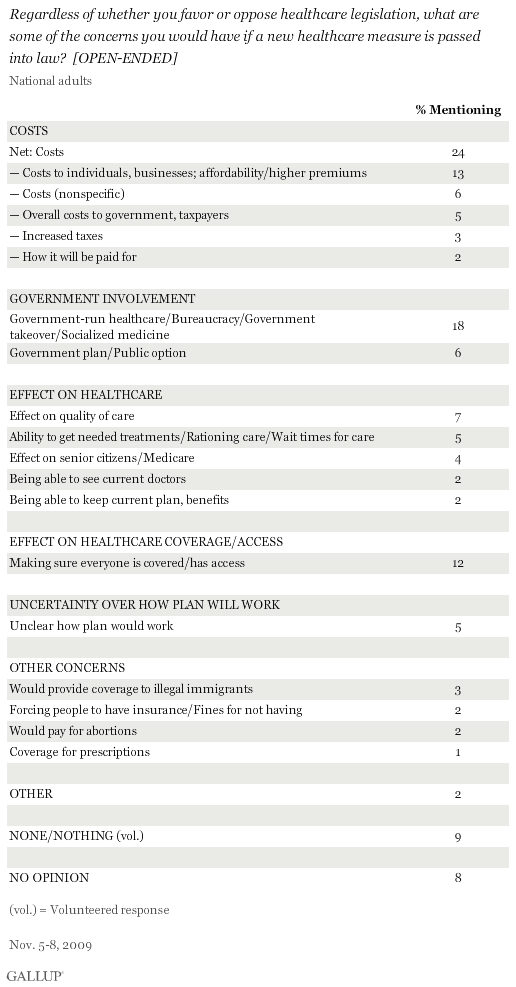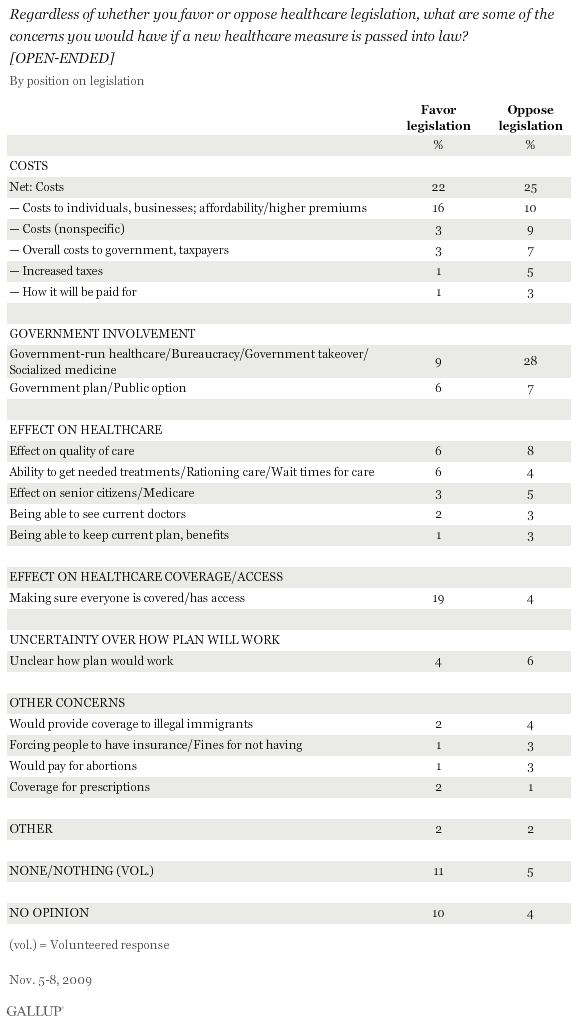PRINCETON, NJ -- Asked to name their concerns if a new healthcare bill is eventually passed into law, Americans say they would be worried about the potential costs of new healthcare legislation, the increased government involvement a new law would mandate, the possibly negative impact on current healthcare delivery, and concerns that the bill won't go far enough in expanding access to healthcare.

This open-ended question was included in Gallup's Nov. 5-8 Health and Healthcare survey, and the responses were coded into categories, as displayed in the accompanying table.
Americans' worries can be grouped into four broad areas:
-
Concerns about the costs of a new healthcare bill, including worries about personal costs and costs to businesses, costs to the overall system or to the government, and worries about increased taxes.
-
Concerns about increased government involvement in healthcare. These include worries about the development of a new government bureaucracy, socialized medicine, and concerns about the "public option" that has been the subject of much debate in recent months.
-
Concerns about the possibly negative impact of a new healthcare bill on various aspects of healthcare delivery, including having to wait for procedures, possible healthcare rationing, the quality of seniors' healthcare, and the ability to keep one's current doctors and current healthcare plan under a new system.
-
Concerns that the new bill would not go far enough in expanding healthcare access.
"The biggest differences between those who support and those who oppose a new healthcare bill relate to government involvement and access to healthcare. "
A small percentage of Americans mention coverage of illegal immigrants as a top concern about new healthcare legislation. Two percent mention abortion, although the majority of interviews in this survey were completed before the controversial "Stupak" amendment included in the House bill became a major focus of news coverage. Seventeen percent do not mention any concerns about a new healthcare bill.
Differences Between Those Who Support and Those Who Oppose a New Bill
In a separate question included in the survey, respondents were asked if they would advise or lean toward advising their member of Congress to vote for or against the legislation.
The accompanying table displays the concerns about new healthcare legislation among the resulting two groups.

There is relatively little difference between those who favor and those who oppose new healthcare legislation in terms of concerns about costs, although each group may have different takes on the aspects of costs they are worried about.
The biggest differences between those who support and those who oppose a new healthcare bill relate to government involvement and access to healthcare. Those who oppose a new healthcare plan are much more likely to be concerned about government involvement than are those who favor it. On the other hand, those who favor the plan are much more likely to be concerned about the plan's not going far enough in increasing access to healthcare. A much higher percentage of reform proponents than detractors (21% vs. 9%) do not indicate anything about the potential healthcare legislation that concerns them.
Discussion
The debate over new healthcare reform legislation has moved to the Senate, where lawmakers will continue to wrestle with what could become one of the most far-reaching pieces of domestic legislation in decades. Americans remain split on the potential impact of such new legislation on the U.S. healthcare system and there is a generally even public divide between those who say they would advise or lean toward advising their representative in Congress to vote for a new healthcare bill and those who would advise their representative to vote against it.
The current findings help illuminate the specific concerns Americans would have if such a new bill is passed into law. Although House lawmakers put the word "affordable" in the title of their bill, Americans nevertheless remain worried about the cost implications of healthcare reform -- to them personally, to businesses, and to the government and system as a whole.
Lawmakers are working on a new bill with the obvious conviction that it will improve the healthcare situation in the country, but many Americans appear to be worried about the possible negative effects of healthcare reform on their own situations, or simply are not clear what its impact will be.
Some Americans, particularly those who oppose a new bill, remain worried about the burgeoning role of government in healthcare that would result from the passage of a new bill. And Americans who support a new bill are worried that it may not go far enough in expanding access to healthcare to those who currently don't have it.
Survey Methods
Results are based on telephone interviews with 1,008 national adults, aged 18 and older, conducted Nov. 5-8, 2009. For results based on the total sample of national adults, one can say with 95% confidence that the maximum margin of sampling error is ±4 percentage points.
Interviews are conducted with respondents on land-line telephones (for respondents with a land-line telephone) and cellular phones (for respondents who are cell-phone only).
In addition to sampling error, question wording and practical difficulties in conducting surveys can introduce error or bias into the findings of public opinion polls.
